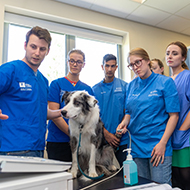
University of Nottingham team emphasises importance of quality research
The School of Veterinary Medicine and Science at the University of Nottingham is celebrating ten years since the launch of the Centre for Evidence-based Veterinary Medicine.
The centre was opened in 2010 with the aim of emphasising the importance of good quality research and using an evidence-based approach in veterinary care. Since then the centre has carried out numerous impactful projects, including a collaboration with the Pet Blood Bank to investigate the processing method for canine blood banking.
This project helped to save lives by changing the way blood donations are handled, resulting in an increase in the amount of donations that can be made, as well as a decrease in wasted donations.
To this day it is the only research institution that focuses solely on generating evidence-based resources for veterinary practice, as well as undertaking research that is relevant to the everyday cases and experiences of practitioners.
Specialists from the university work directly with the veterinary profession to create evidence-based resources for both education and training. The team aims to enhance clinical research and clinical decision-making through their work with the centre.
Dr Marnie Brennan, director of the centre, said: “It has been inspiring to witness the enthusiasm, drive and motivation of the members of this wider team. Along with external funders and supporters focused on the same key goals as us, we have accomplished great things.
“I’m really proud of the achievements of our team, and where their dedication has taken them as individuals, and us as a group. The profession needs strong leadership in this area, and through this initiative, we believe we have contributed a much-needed voice for the profession.”
Image (c) University of Nottingham.



 The latest
The latest